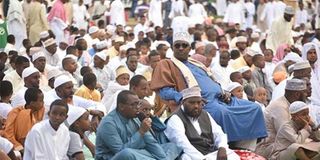Section of Muslims defy Chief Kadhi, hold Idd-ul-Fitr prayers

Muslims faithful gather at Tononoka Grounds in Mombasa on June 4, 2019 for Idd prayers. A section of Muslim faithful have defied Kenya's Chief Kadhi Ahmed Muhdhar’s advice to mark Idd-ul-Fitr on Wednesday.
What you need to know:
- Some of went for prayers on Tuesday after it was reported that the moon had been sighted in northeastern Kenya.
- Scholars said there has been an open defiance to the Chief Kadhi, mostly by people from the Coast.
The annual row between Muslims over when to begin the Idd ul Fitr celebrations occurred again another Tuesday as some of thronged mosques and open grounds for the prayers.
The faithful were Tuesday divided over Idd-ul-Fitr celebrations as a section appeared to ignore Chief Kadhi Ahmed Muhdhar’s advice to celebrate the occasion on Wednesday.
In Mombasa, hundreds of Muslims thronged Tononoka, Serani and other grounds for the prayers.
Some also went to pray in mosques in Nairobi. Most Muslims in the North-Eastern region also held prayers.

Muslim faithful gather for Idd prayers at Highway Primary School in Kisumu on June 4, 2019. PHOTO | ONDARI OGEGA | NATION MEDIA GROUP
But others continued fasting as advised by Sheikh Muhdhar on Monday evening. He made the announcement in Mombasa after he failed to see a crescent moon, which signifies the end of Ramadhan.
“We have not received any reports about the moon being sighted in the country, and for that reason we are yet to complete the 30 days of fasting,” said Sheikh Muhdhar.
DEFIANCE
But some of went for prayers on Tuesday after it was reported that the moon had been sighted in northeastern Kenya.
Among those who said the moon had been sighted was National Assembly Majority Leader Aden Duale.
“EidMubarak, Minalaaidin Waminal Faaizin to all our Muslim brothers and sisters. The moon has been sighted in Garissa, Wajir and other Muslim countries. May Allah the Almighty bring you and your families happiness, joy, prosperity, and peace on this blessed moment,” Mr Duale posted on Twitter on Monday evening.
Some of the faithful faulted the Chief Kadhi for “misleading” them, saying the moon had been sighted.

Muslims converge for Idd-ul-Fitr prayers at Jamia Mosque grounds in Mandera town on June 4, 2019. PHOTO | MANASE OTSIALO | NATION MEDIA GROUP
The differences are mainly between Muslims from the Coast and those from northeastern.
Scholars who spoke to Nation but did not want to be named because of the sensitivity of the matter said there has been an open defiance to the Chief Kadhi, mostly by people from the Coast.
PAST KADHIS
The first Kadhi was Abdallah Kassim, a member of the Mazrui family in Mombasa. He was succeeded by Swaleh Abdallah Farsy, who has traces his roots to Zanzibar, but is considered a Kenyan.
He was succeeded by Nassor Nahdy, also from Mombasa, and who reigned the longest. He was also from Mombasa.
Then came Hammad Kassim, also a Mazrui family member, who was followed by the current Kadhi (Sheikh Muhdhar).
While the previous Kadhis were handpicked by the government, Sheikh Muhdhar was appointed through vetting, after the position was publicly advertised.
QUALIFICATIONS
The qualifications for a chief kadhi include a degree in Islamic Law from a recognised institution, and one must have served as a kadhi for more than 12 years.
Meanwhile, the controversy has also been made the mandate of the office of the Chief Kadhi, but a section of the Muslims argue that it has no mandate on announcing the start and end of Ramadhan.
The law says that the jurisdiction of “Kadhis’ Court is limited to the determination of questions of Muslim Law relating to personal status, marriage, divorce or inheritance in proceedings in which all the parties profess the Muslim Religion and submit to the jurisdiction of the Kadhis’ courts”.




